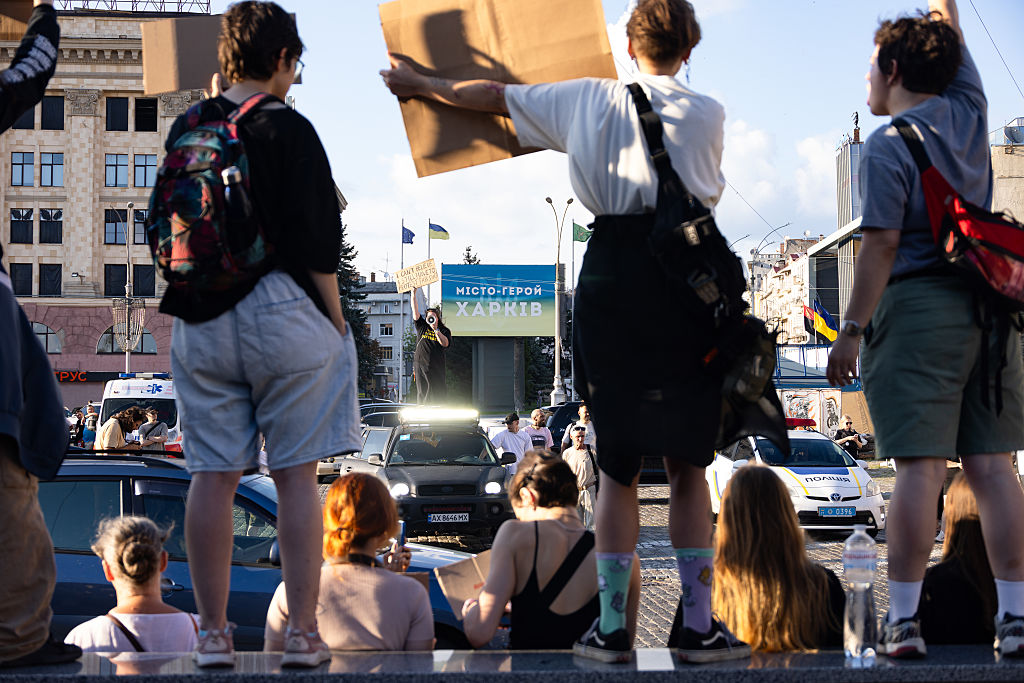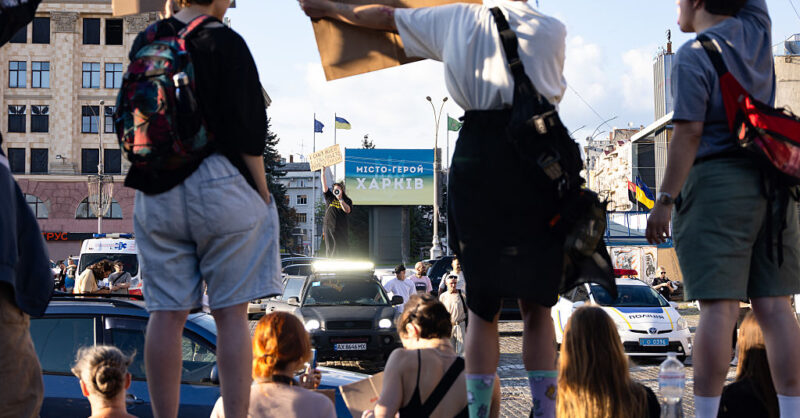
Photo by Nikoletta Stoyanova/Getty Images
Late into the evening on 22 July, thousands of protesters rallied outside the presidential administration in Kyiv, despite the real danger of Russian missile strikes, urging Volodymyr Zelensky not to halt a new law limiting the independence of the country’s anti-corruption agencies. The bill had been rushed through parliament earlier that day, where Zelensky’s Servant of the People party holds a majority. Now the only person who could stop if was the president himself.
The crowds outside his office, which included numerous veterans of the war with Russia, chanted “Shame!” and “Veto the bill!” One person held up a cardboard sign that said, “My father did not die for this”. Hundreds more came out onto the streets of Lviv, Dnipro and Odesa to protest. Yet Zelensky signed the bill into law.
Critics say the bill curtails the independence of Ukraine’s main anti-corruption agencies, the National Anti-Corruption Bureau (NABU) and the Specialised Anti-Corruption Prosecutor’s Office (SAP), which were established after the Maidan Revolution that ousted then-president Viktor Yanukovych from power in 2014. Both agencies will now be brought under the control of Ukraine’s prosecutor general, who is appointed by the president, giving the Zelensky administration the de facto power to halt corruption investigations that target senior officials.
“With this decision, Parliament not only strips society of one of the greatest achievements since the [2014] Revolution of Dignity – independent anti-corruption institutions – but also undermines the trust of Ukraine’s international partners,” the NGO Transparency International’s Ukraine office said in a statement. By signing off on the legislation, the organisation said Zelensky shared responsibility “for dismantling Ukraine’s anti-corruption infrastructure”. Ambassadors for the G7 who were in Kyiv at the time and held a meeting with NABU officials, released a joint statement expressing their “serious concerns” and stressing the importance of efforts to “support transparency, independent institutions, and good governance” in Ukraine.
In the early hours of 23 July, Zelensky posted a video message on social media defending his decision and insisting that the country’s anti-corruption agencies would continue to function and were merely being cleansed of “Russian influence”. He claimed that anti-corruption investigations “worth billions” had been left “hanging” for years and that the restructuring was necessary to ensure that “more justice” would be done. He posed for a photo with the leaders of the main law enforcement agencies, including NABU and SAP, later that day, stressing that they shared “a common enemy: the Russian occupiers”.
Seemingly acknowledging the protests, he conceded that “we all hear what society is saying” about the need for effective institutions and vowed to work together with the anti-corruption agencies to “strengthen Ukraine”. This did little to assuage the protesters, who gathered again, in even greater numbers that evening to demand he reverse course.
This is not happening in isolation. In recent weeks, Zelensky has been accused of attempting a cynical power grab by using his wartime powers to sideline his political rivals and silence critics. He reshuffled his government earlier this month to appoint a new prime minister, Yulia Svyrydenko, who is seen as a protégé of his powerful chief of staff, Andriy Yermak, alongside other loyalists in the cabinet. On 21 July, Ukraine’s domestic security service searched the homes of dozens of NABU and SAP investigators who were said to be accused of corruption and illegal ties to Russia.
Subscribe to The New Statesman today from only £8.99 per month
The bitter feuds that have long characterised Ukraine’s domestic politics had appeared to be effectively frozen since the full-scale Russian invasion in 2022. They have now resumed with a vengeance. Perhaps Zelensky will eventually be proved correct in his claim to be fighting to liberate the country’s political institutions from the long-running scourge of corruption and Russian influence. But it is beginning to look to many of his past supporters as though he is really fighting to preserve his own political power base. Vitaliy Klitschko, the mayor of Kyiv and a long-time political rival, said the law did not bring Ukraine “any closer” to the European Union, or the “values that Ukrainian soldiers are dying for today”.
The danger for Zelensky – and Ukraine – is immediate and on two fronts. First, there is the danger that renewed political infighting will undermine the morale of the country’s already overstretched armed forces at a time when Russia is stepping up its onslaught as part of a long-feared summer offensive. Ukrainian soldiers are fighting, at tremendous cost, to defend their country’s independence and democracy — not to perpetuate a new form of oligarchy. Then, there is the threat to Ukraine’s international support if its Western backers, chief among them the US, come to doubt the country’s commitment to the anti-corruption reforms and strengthening the rule of law, which have been a key condition of the provision of overseas aid and Ukraine’s EU candidate status. For all his newfound concern for Ukraine, Donald Trump is unlikely to need much encouragement to turn away from Kyiv. All of which is only likely to further bolster Vladimir Putin’s confidence that the war is finally trending in his direction and that he can hold out for his original objective of subjecting Ukraine.
It is worth remembering that Zelensky rose to political prominence in Ukraine through his popular television show, Servant of the People, where he played a humble schoolteacher who was catapulted to the presidency on a vow to tackle the country’s endemic corruption. It was a comedy, whose running punchline over three seasons was how often his efforts were thwarted by the entrenched oligarchy and how deeply the culture of corruption had permeated the political elite, including his long-time allies and friends. Those jokes don’t seem so funny anymore.
Zelensky was elected in 2019, in no small part, on the strength of his pledge to deliver a new kind of politics for Ukraine. It was to be a decisive break from the corrupt oligarchy that had dominated the country’s political landscape for so long. Three years later, he was catapulted into a war with Russia, where he was widely acclaimed for his personal courage in refusing to flee Kyiv and his political acumen in rallying Ukrainians and allies to fight back. He now confronts perhaps the greatest test of his presidency – and a pivotal moment in Ukraine’s modern history. Zelensky must decide what, exactly, he is fighting for, and how much he is prepared to sacrifice in that cause. Is he prepared to risk weakening his own power base and giving up key political allies in the interests of country as a whole? The answer will determine his legacy, and perhaps the outcome of this war. He cannot credibly claim to be defending Ukrainian democracy if he is seen to be presiding over the degradation of that same democracy.
In his nightly address on 23 July, there were encouraging signs that Zelensky might be preparing to back down. The criticism of the bill had not fallen “on deaf ears”, he said. He promised to propose a new bill to parliament that would address the protesters’ concerns. But he offered no details and the crowds still gathered on the streets outside his presidential office will now want to see concrete actions, not just words.
[See also: Putin’s endgame]
Content from our partners

